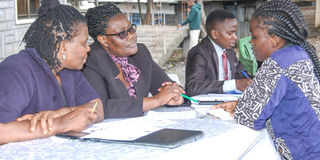Legal Aid: How UNDP is helping Kenya to strengthen access to justice by the needy
Sponsored by UNDP

National Legal Aids Services Ag Director Flora Bidali (left) and the Dean of Egerton University Faculty of Law, Ruth Anyango (centre), attend to a client during a free legal aid service in Nakuru on December 11, 2019. Francis Mureithi | Nation Media Group
The United Nations Development Programme (UNDP) has a global mandate to promote eradication of poverty in all its dimensions, accelerating structural transformation for sustainable development and building resilience to safeguard development gains.
Critical to achieving these objectives is promoting access to justice and fostering rule of law as a pathway to transformative, inclusive and accountable governance. UNDP’s interventions in this regard are aligned with Sustainable Development Goal (SDG) 16, which enjoins all member states of the United Nations to secure access to justice, peace and strong institutions by 2030.
Globally, UNDP is supporting governments in 50 countries to strengthen their justice sectors through technical assistance to judicial officers and legal professionals, improving infrastructure and importantly, providing assistance to legal aid systems.
In Africa alone, UNDP is working with 17 countries to pursue similar strategies focusing on both formal and informal institutions of justice. Relying on the robust human rights normative frameworks at the global and regional levels, UNDP has prioritised integrating human rights-based approaches in providing support to the justice sector. This approach is meant to ensure justice services are accessed by the poor, marginalised and those left behind in a non-discriminatory, accountable and equitable manner.
In Kenya, the UNDP Country Programme Document (2018-22) prioritises access to justice promotion as a key pillar of its transformative governance offer. This links with the transformative governance priority area outlined in the United Nations Development Assistance Framework 2018-22.
UNDP has partnered with the European Union under the Programme for Legal Empowerment and Aid Delivery (PELAD) in Kenya to provide financial and technical assistance to civil society organisations (CSOs) delivering legal aid and advocating for effective implementation of the Legal Aid Act of 2016. This initiative is currently being pursued under the Amkeni Wakenya, a flagship civil society strengthening project of UNDP Kenya. So far, over 35 CSOs have benefitted from this programme in 12 counties.
UNDP sees the importance of harnessing and disseminating knowledge that is emerging from the implementation of the PLEAD initiative, to stimulate public discourse and inform policy development on access to justice. Therefore, UNDP considers the partnership with Egerton University’s Faculty of Law in organising the first National Legal Aid Conference as an important milestone, and looks forward to stronger collaborations with state institutions, civil society, private sector and the academia at large, in advancing innovation and knowledge to promote access to justice, especially for the poor and vulnerable in Kenya.
Egerton University provides legal aid through Faculty of Law Legal Aid Project (FOLLAP), with the support of the European Union and UNDP. The project envisions justice and equality for all. It is through it that the university is co-hosting the first National Legal Aid Conference from December 8-12, 2020, to deliberate on issues of legal aid and access to justice in the country. The theme of the conference is “Strengthening access to justice through legal aid”.
The event is an important platform for open discussions on how the collective efforts of various legal aid service providers can be supported by government, development partners as well as other duty bearers to enhance access to justice for all.
The Government of Kenya supports legal aid through the National Legal Aid Service (NLAS) – the body mandated to facilitate, provide and coordinate legal aid in Kenya.
With poverty having been identified as a major impediment to accessing justice in Kenya, the Government initiated legislation on access to justice (the Legal Aid Act 2016) and the National Legal Aid Action Plan (NLAAP).
NLAAP covers seven objectives that are crucial for the establishment of a sustainable and quality legal aid and awareness framework in line with the Constitution and other human rights standards.
These are:
- To establish a framework for policies, laws and administrative processes that will ensure sustainable and quality access to justice to all.
- To provide quality, effective and timely legal assistance, advice and representation for the poor, marginalised and vulnerable.
- To enhance access to justice through continuous legal awareness.
- To promote and institutionalise the paralegal approach in access to justice.
- To promote the use of Alternative and Traditional dispute resolution mechanisms.
- To establish an implementation, monitoring, regulatory and support framework for legal aid and awareness services in Kenya.
- To ensure and promote adequate allocation of resources, including fiscal, human and technical for legal aid and awareness services in Kenya.


